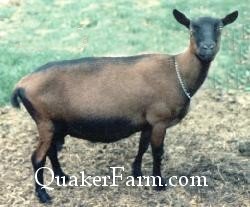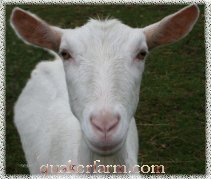 Quaker Farm Home
Quaker Farm Home
Raw Honey
Buff Orpington
Chickens
Border Leicester & Cotswold
Sheep
Collie Dogs
Quaker Pantry
Recipes & more!
Sustainable Living Workshops
|
Quaker Farm
QuakerFarm.com
 About Dairy Goat or Dairy Cow Shares
The following share information relates to both dairy goat and dairy cow shares.
About Dairy Goat or Dairy Cow Shares
The following share information relates to both dairy goat and dairy cow shares.
It does not constitute legal advice in any way.
Quaker Farm Dairy Goat Shares are not
available at this time.
What is a dairy goat or dairy cow share?
A share is part ownership of a dairy cow or a dairy goat. Owning a dairy goat or cow, or
a portion of a dairy goat or cow,
entitles you a certain percentage of what that animal produces.
Each State has different laws regarding milk.
In the State of Michigan, you may drink
milk from a goat or cow that you own. By owning a share in a dairy goat or cow, you have a
fresh supply of your own
milk to drink; you are generally allotted a weekly share of fresh,
usually raw (unpasteurized) milk ready for pickup at a designated time. Plus, you are also
allotted a
share of manure (great for gardening compost) from your goat or cow.
How does a goat or cow share work?
You share, along with others, own a percentage of a dairy goat or a cow. This entitles
you to receive a portion
of the milk and the manure which that animal produces during the time of your share contract.
Cows and goats require care such as maintenance, feeding, housing, milking and more.
A farm would board your goat or cow, care for it, milk it, and prepare
the milk for you to pickup from the farm. You pay the herdsman for the boarding, care, feeding,
and milking of your goat or cow.
How much milk can I expect from a cow or goat share?
One share might provide approximately one gallon of milk for about thirty three weeks or so, depending on
the individual farm and depending on the individual animal. Each breed of dairy goat milks a different amount, and
the same is true of individual breeds of dairy cows. The farm you work with will know what these amounts are.
For instance, the average lactation for dairy goats at Quaker Farm is around 8 months (April to December).
However, a goat or a cow elsewhere might milk for a shorter or longer period of time.
Many dairy goat farmers milk their does for at least eight months, but sometimes more.
This is rough and general estimate which will likely vary farm to farm.
What if I would like more milk than one gallon a week?
Purchase a second, third, or fourth share. You can usually purchase as many goat or cow shares as needed, although,
some farms have a waiting list.
How much does a dairy goat share cost?
When we offered shares at Quaker Farm, you first purchased a goat share(s) for $45.00 per share, per year.
Then, once you owned a dairy goat share, you needed to board your goat. Boarding or husbandry costs were
$40.00 per month. This entitled you to approximately 1 gallon of milk per week, however,
since milk production fluctuates, this amount was subject to change slightly throughout any given season.
Remember, cow or goat, you
are purchasing a share of
ownership of a particular animal and the amount of milk that animal produces will likely vary.
How do I pay my boarding fee?
To avoid any confusion that a person might be "buying" raw milk, we did not accept
payment of the boarding fee at the time of
milk pick-up. For example, boarding fees might be be paid on the first of each month.
How do I get started?
Thoroughly review the information provided about dairy cow or dairy goat shares from the farm you will
purchase a share from. Then, request and review the
purchase and boarding contract from that farm. Sign the contract (if they provide one)
and once payment is received
you will be the proud owner of a dairy goat or dairy cow share.
Quaker Farm Dairy Goat Shares are not
available at this time.
What happens if I can no longer use the milk?
If you move, buy your own milking goat or milking cow, or otherwise
find yourself no longer using milk, you might be able to sell your share to the
next person on the waiting list at the farm you purchased the share from - if that opportunity
is available. You usually may not sell your shares to a third party.
Please note: it is illegal to sell milk in Michigan if you are not a licensed and inspected dairy.
If you live in Michigan, never sell your excess milk, it is against the law in the state of Michigan unless you are licensed
to do so.
As a share owner, would I have a share in the kids or calves?
Generally, no. The ownership of kids or calves is usually retained by the farm you purchased your share from.
 About raw goat milk
About raw goat milk
The proteins in goat milk are different from cow milk protein, making them easier for humans to digest. Goat
milk is also naturally homogenized. The cream stays suspended in the milk. Raw milk contains many natural
enzymes that are destroyed in the pasteurization process that commercial milk undergoes. There are
many reasons for wanting to drink raw goat milk. The best may be that it tastes good!
Are goat shares legal?
It is not legal in the State of Michigan to sell raw (unpasteurized) milk to the public.
If you own a share in a dairy cow or dairy goat herd, it is our understanding that you may
legally use the milk from your share of that cow or goat in any way you see fit. Please research this information
for yourself and seek legal counsel as needed. We do not presume to interpret the law for anyone.
Generally speaking, you should expect to purchase a share of a dairy cow or goat
from a herd at a farm and then pay a monthly
boarding fee for your share. You will generally be asked to sign a contract for your cow or
goat share at the
time of purchase. You will likely receive a Bill of Sale for your share and a copy of the written
boarding agreement for your cow or goat.
General Milk Handling Instructions
The following is information we provided for dairy goat share customers.
It does not constitute legal advice.
Quaker Farm Dairy Goat Shares are not
available at this time.
How should I handle my milk after I pick it up?
The milk supplied will be raw - that is, it is not heat-treated or pasteurized. It will be chilled;
and you should take care that it remains so until you can get it home and into your refrigerator. If
you have some distance to drive or stops to make before you arrive home, it is very important to...
Continued in About Dairy Goat or Dairy Cow Shares Part 2
|